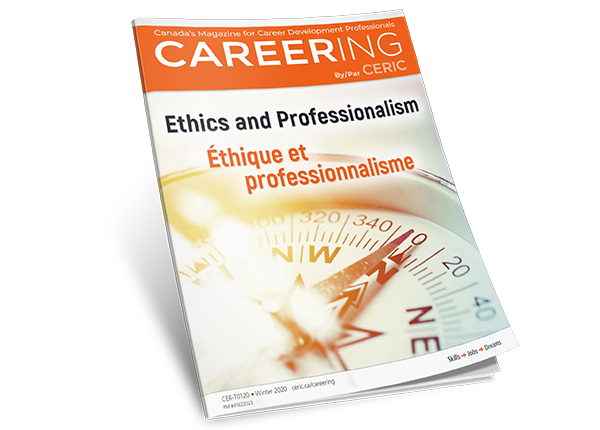
The Winter issue of Careering highlights ethics and professionalism
February 5, 2020
Cannexus20 explored career development in Canada through many different lenses
February 11, 2020If you’re a career professional in Canada, chances are you identify as female (a whopping 82.6% of you do), have a Bachelor’s degree, and are between 45 and 54 years of age. You are most interested in learning that helps you support adults in career transition, you need research related to mental health more than in the past and the biggest issue you anticipate affecting your practice is government funding. This snapshot of the field comes from the newly released results of the 2019 CERIC Survey of Career Service Professionals.
This latest CERIC Survey of Career Service Professionals is a national survey that was completed by 1,350 career professionals across Canada from November 1-29, 2019 – making it the largest response yet. The findings help CERIC, and the field at large, to better understand interests and challenges among career professionals, as well as priorities for professional development. This comprehensive survey is only done once every four years. It was previously run in 2011 and 2015 and provides rich data on the state of the career services community in Canada and how it has changed over time.
Education, salary and career progression
Survey results underscore the diversity of the career development field in Canada when it comes to educational background. For 21.4% of respondents, career development itself was the main focus of their highest level of applicable post-secondary studies, followed by 17.6% who had a background in education, and 12.2% who cited counselling, guidance or educational psychology. A total of 79.9% of career professionals hold a Bachelor’s degree while a further 35.3% have a Master’s.
Consistent in both 2019 and 2015, the top two services career professionals are engaged in are: career counselling and coaching, and employment advising and job coaching, followed by program planning/program delivery in this year’s survey. Career professionals reported that the top elements affecting their ability to effectively deliver their services are (respondents could check all that apply):
- Heavy workload (49.4%)
- Insufficient time to spend with clients/students (40.1%)
- Inadequate financial resources (38.0%)
- Limited support from institutional/organizational leadership (26.1%)
- Limited access to appropriate resources (23.7%)
Levels of experience in the field are fairly evenly spread out with just under half of career professionals (47.6%) having 10 or fewer years of experience and just over half (50.4%) having more than 10 years of experience. Salaries reported among career professionals continue to be modest, though increase with experience. Those with 10 or fewer years’ experience report on average making $40,001-$55,000 a year; those with 11-20 years’ experience earn $55,001 to $70,000; and those with more than 20 years’ experience typically make up to $85,000.
Looking ahead to their own career progression, most career professionals see themselves remaining with their current employers. Over the next five years, one-third (33.5%) plan to stay in a similar role within the same organization, while 19.3% expect to move into a more senior role in the same organization, and 18.6% of career professionals anticipate a jump to a different employer. Just over 1 in 10 career professionals (11.6%) intend to be retired by 2025.
On the flip side, career professionals report multiple challenges with hiring for open roles in the field with the number one issue (20.9%) finding candidates with direct education or training in career development, followed by insufficient career development skills (18.5%) and limited experience in the field (15.1%). Specific comments included:
“There are not enough people with appropriate skills.”
“Most candidates have limited counselling skills for working with marginalized, multi-barriered clients.”
“Difficult to attract qualified and experienced people with the compensation package offered.”
Professional development and competency improvement
While those in the field value professional development, budgets provided by employers are limited. More than 1 in 4 career professionals (26.7%) indicate they do not have access to any professional development budget; 21.6% report that they receive less than $500 annually and 19.5% receive between $500 and $1,000. However, the overwhelming majority of career professionals (90.4%) would invest personally in their own professional development, with 52.0% willing to pay under $500 a year.
When it comes to formal learning approaches, career professionals show a preference for face-to-face interaction with half of survey respondents (50.7%) saying their top choice is to train through an in-person seminar or workshop. Rounding out their top three picks are online courses (37.0%) and conferences (36.1%). By contrast, in terms of informal learning, nearly two-thirds of career professionals (62.7%) turn to internet searches to keep up to date, with 48.5% watching video, and 45.8% reading online magazines and newsletters.
Asked which client groups they would prefer to focus their professional development on (and to check all that apply), the majority of career professionals in Canada are interested in strategies and tools that help them work with adult populations facing a variety of barriers:
- Adults in career transition (57.6%)
- People with mental health challenges (41.0%)
- New Canadians/immigrants (39.8%)
- People with low income (35.5%)
- Unemployed (35.3%)
- Post-secondary students (35.1%)
For more than half of career professionals surveyed, high or essential priority competencies to develop in the next year include: client relationship management (eg, case management, group facilitation and working with diverse groups) at 58.0%; personal/network development practices (eg, community-capacity building, stress management and leadership) at 55.3%; and career data competencies (labour market information, future of work) at 54.9%. The top three topics that career professionals would most like to see career development research focus on are: career counselling techniques, LMI such as employment trends – and mental health, which is up considerably from the No. 7 spot in the 2015 survey.
The future: Public perceptions and client concerns
With an eye to the future, career professionals anticipate the most significant changes in their practice over the next five years to be:
- Change in government priorities, processes or funding
- Impact of technology, AI or automation on jobs and job searching
- Labour market shifts, a changing job market and the rise of the gig economy
- Increased use of online services, tools, resources and social media
- Shifting demographics
- Working with more clients or students facing barriers
At the same time, career professionals believe gaps persist in the public perception of the value of career services in Canada compared with the reality:
- Many respondents (43.3%) felt that the public either doesn’t know career services exist or do not understand the breadth and complexity of services: “I think that the public is mostly unaware of services that are provided by career service professionals.”
- A smaller group of career professionals (17.7%) believe career services are viewed positively for their life-changing potential but that there is still some lack of clarity around how career services operate: “Invaluable resource, but (public) doesn’t know everything we can help with.”
- A smaller number of respondents (10.7%) think the public would give mixed reviews to career services based on their range of personal experiences: “Some people perceive great value if they hit a wall and seek help, others don’t need us and therefore don’t see value.”
- And, finally, a similar number (10.2%) think the predominant public perception is one that is misinformed about the nature of career services: “I think they perceive us as accessible only through college/university career centres for students or government low-income programs.”
For the first time, the CERIC Survey of Career Service Professionals also posed a series of questions related to the anxieties, regrets and myths that career professionals hear from their clients. Career professionals surveyed report that the students and adults they advise say they would go back and change their career choices if they could. Among their clients:
- 71.7% say “I wish I had understood myself better and chosen a career that is aligned with my values”
- 66.5% say “I wish I hadn’t been pressured into pursuing a career I didn’t want to pursue”
- 61% say “I wish I hadn’t played it safe and let fear prevent me from taking a different career direction”
- 58.8% say “I wished I hadn’t narrowed my options so soon and been able to explore other careers”
Career professionals indicated that Canadians want to balance their search for a career they are passionate about with economic realities. Their clients are evenly divided with 49.4% concerned about their ability to find decent-paying work and 45.3% anxious about making the “right” career decision. In Quebec, however, the number of clients seeking support with career decision-making jumps to 70.2%. Of note, only 3.2% of career professionals nationally report that their clients are fearful of AI/automation and what that means for their job prospects, which differs from would be expected given the level of public discussion around technology displacing workers.
Further exploration of survey results will continue this year with regional and sectoral analysis as well as comparisons with previous surveys.

